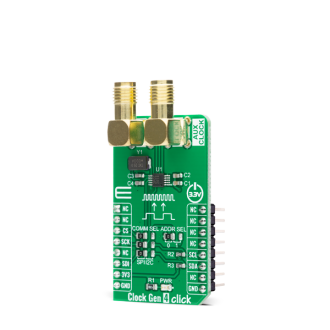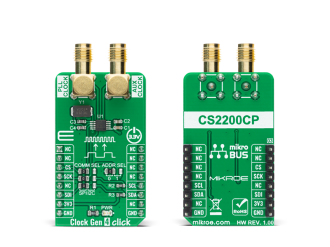
We strongly encourage users to use Package manager for sharing their code on Libstock website, because it boosts your efficiency and leaves the end user with no room for error. [more info]

Rating:
Author: MIKROE
Last Updated: 2020-10-22
Package Version: 1.0.0.0
mikroSDK Library: 1.0.0.0
Category: Clock generator
Downloaded: 2865 times
Not followed.
License: MIT license
Clock Gen 4 Click is a compact add-on board that contains both a clock generator and a multiplier/jitter reduced clock frequency synthesizer. This board features the CS2200-CP, an analog PLL architecture comprised of a Delta-Sigma fractional-N frequency synthesizer from Cirrus Logic.
Do you want to subscribe in order to receive notifications regarding "Clock Gen 4 click" changes.
Do you want to unsubscribe in order to stop receiving notifications regarding "Clock Gen 4 click" changes.
Do you want to report abuse regarding "Clock Gen 4 click".


Library Description
The library covers all the necessary functions to control the Clock Gen 4 Click board. User can use functions that allow writting to different registers in order to apply different settings or the ratio between the output signal and the input clock, or to read data using I2C communication exclusively.
Key functions:
void clockgen4_dev_ctl ( uint8_t dev_ctl ); - Function is used to write to Device Control register in order to apply settings.void clockgen4_dev_cfg ( uint8_t dev_cfg ); - Function is used to write to Device Configuration 1 register in order to apply settings.uint32_t clockgen4_set_ratio ( float ratio ); - Function is used to set the ratio between the output signal and the input clock.Examples description
The application is composed of three sections :
void application_task ( )
{
clockgen4_dev_ctl ( CLOCKGEN4_AUX_OUT_DIS | CLOCKGEN4_CLK_OUT_EN );
mikrobus_logWrite( " PLL Clock ", _LOG_LINE );
mikrobus_logWrite( " output enabled! ", _LOG_LINE );
mikrobus_logWrite( "---------------------", _LOG_LINE );
Delay_ms( 1000 );
clockgen4_dev_ctl ( CLOCKGEN4_AUX_OUT_EN | CLOCKGEN4_CLK_OUT_DIS );
mikrobus_logWrite( " AUX Clock ", _LOG_LINE );
mikrobus_logWrite( " output enabled! ", _LOG_LINE );
mikrobus_logWrite( "---------------------", _LOG_LINE );
Delay_ms( 1000 );
}
Other mikroE Libraries used in the example:
Additional notes and informations
Depending on the development board you are using, you may need USB UART click, USB UART 2 click or RS232 click to connect to your PC, for development systems with no UART to USB interface available on the board. The terminal available in all MikroElektronika compilers, or any other terminal application of your choice, can be used to read the message.